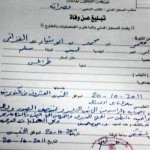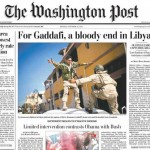
Inaugural Session of Tunisia’s Constituent Assembly
الجلسة الافتتاحية للمجلس الوطني التأسيسي
The newly elected Constituent Assembly held its inaugural meeting Tuesday, 22 November, 2011 and began the yearlong process of shaping the constitution and the democratic future of the country that sparked the Arab Spring uprisings.
Hundreds of people protested outside Parliament, demanding everything from women’s rights and reforms to limits on foreign influence over Tunisia’s affairs. Within the body’s chambers the new opposition attempted to flex its wings and challenge the majority coalition.
The assembly elected Mustapha Ben Jaafar, Ettakatol party president, as its speaker and in future sessions he will nominate a president who will appoint a prime minister to form a new government. Maya Jribi, leader of the left of center Progressive Democratic Party, ran against him, but was beaten 145 votes to 67.






Tunisia’s new assembly holds “historic” first session
Tue, Nov 22 2011
By Tarek Amara
TUNIS (Reuters) – Tunisia’s constitutional assembly, elected after a revolution that inspired the “Arab Spring” uprisings, held its opening session on Tuesday, described by officials as an historic step toward democracy.
The assembly, which will sit for a year to draft a new constitution, is dominated by a moderate Islamist party whose election win last month resonated in other countries in the region where Islamists are gaining ground after the popular protests which swept three Arab heads of state from power.
Members of the assembly, senior officials in the incoming coalition government, and ministers in the outgoing cabinet stood for the Tunisian national anthem in a ceremony to open the 217-seat assembly.
“This is an historic moment .. for the transition to democracy,” Fouad Mebazza, the outgoing interim president, said at the ceremony, in the same building where the previous rubber-stamp parliament sat before the revolution.
There was a reminder of the challenges facing Tunisia’s new rulers, when about 1,000 protesters gathered outside the building.
Among them were relatives of people killed in the revolt that ousted veteran president Zine al-Abidine Ben Ali, who are now demanding compensation from the state.
The protesters included the mother of Mohamed Bouazizi, the young vegetable seller who set himself on fire last December in an act of protest that triggered the revolution.
Demonstrators held up placards saying “We want justice!” and “The people want a new revolution.”
A man called Slim Hamdi, 28, said he and the other protesters were there to send a message to the new authorities. “We are not going to leave you in peace if you do not take the right path,” he said.
Tunisia’s government will be dominated by the moderate Islamist Ennahda party, which emerged from the election with the biggest contingent in the assembly, but short of a majority.
Its victory was the first for Islamists in the Arab world since the Hamas faction won an election in the Palestinian Territories in 2006.
Tunisian secularists say their liberal values are under threat, but Ennahda has assured them it is not planning any radical changes.
Ennahda has shared out the top three state posts with two smaller, secularist parties. Hamadi Jbeli, Ennahda’s secretary general, will be prime minister, the most powerful role.
Moncef Marzouki, head of coalition partner the Congress for the Republic, will have the largely ceremonial post of Tunisian president. Mustafa Ben Jaafar, leader of the Ettakatol party, was nominated as speaker of the new assembly.
A new cabinet line-up, with posts shared out between the three coalition partners, is to be announced soon.
In its first act, the assembly voted to confirm Ben Jaafar as speaker.
He received 145 votes, four members abstained, and 68 voted for the rival candidacy of Maya Jribi, of the secularist PDP party. Her party warned Islamist rule will undermine Tunisia but performed poorly in the election.
Mohamed Abbou, an official with Marzouki’s party, said the new government was aware of the weight of expectation from Tunisians who want to see their new democratic freedoms matched by more jobs and higher wages.
“This moment is the dream of all Tunisians,” he said. “We say to the protesters: ‘Do not worry, we are not going to neglect your demands’.”




























